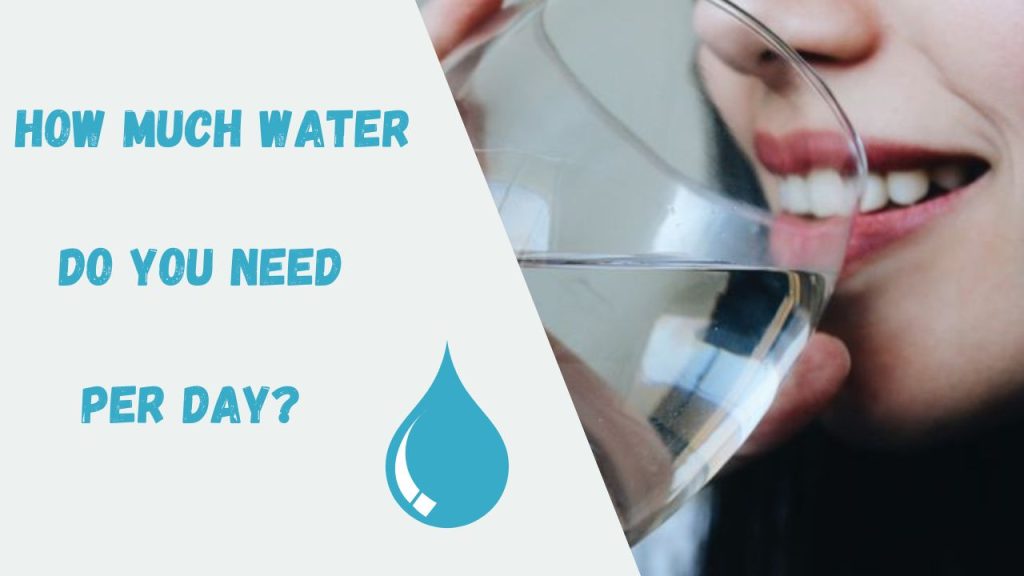Do you know how much water you should drink per day? It’s important to stay hydrated, especially during the hot summer months. Most people need about eight glasses of water per day, but it varies depending on your weight and activity level. Here are a few tips to help you stay hydrated this summer. thirst-quenching advice below!
Water is essential for human life, yet many people don’t realise how important it is to drink enough every day. The amount of water you need depends on your weight and activity level, but most people need about eight glasses per day. Staying hydrated is crucial during the summer months, when the weather is hot and you’re more likely to sweat. Here are a few tips to help you stay hydrated this summer.
What about the advice to drink 8 glasses a day? Is it true?

It is a general piece of advice that most people need around eight glasses of water per day. However, this can vary depending on a person’s weight and activity level. It is especially important to stay hydrated during hot summer months.
Is water the only option for staying hydrated?
No, there are other options for staying hydrated besides water. You can also drink juices, sports drinks, and even tea or coffee. However, water is the best option because it is calorie-free and doesn’t contain any sugar. If you are exercising or sweating a lot, you may want to drink a sports drink to replace electrolytes. But for most people, water is the best way to stay hydrated. Thanks for reading! I hope this was helpful.
How do I know if I’m drinking enough?
Most people need about eight glasses of water per day, but it varies depending on your weight and activity level. The best way to make sure you’re drinking enough is to listen to your body. If you’re feeling thirsty, tired, or have a headache, drink some water. You should also make sure to drink before and after exercise, and during hot weather.
What are some ways to make sure I stay hydrated?
There are a few easy ways to make sure you’re getting enough water every day. First, try carrying a water bottle with you so you can take small sips throughout the day. You can also flavor your water with fruits or herbs to make it more enjoyable. Finally, make sure to drink before and after exercise, and during hot weather.
Advantages:
- Drinking water can help you lose weight.
- Drinking water can help you stay energised.
- Drinking water can help you avoid headaches.
- Drinking water can help you stay cool in hot weather.
- Drinking water can help you recover from exercise.
- Drinking water can help you avoid dehydration.
- Drinking water can help you maintain a healthy weight.
- Drinking water can help you prevent kidney stones.
- Drinking water can help you improve your skin complexion.
- Drinking water can help you boost your immune system.
- Drinking water can help you prevent constipation.
- Drinking water can help you reduce the risk of heart disease.
- Drinking water can help you reduce the risk of cancer.
- Drinking water can help you live longer.
- Drinking water can help you save money.
- Drinking water can help you protect the environment.
- Drinking water can help you reduce stress.
- Drinking water can help you sleep better.
- Drinking water can help you improve your mental health.
- Drinking water can help you reduce the risk of accidents.
- Drinking water can help you stay healthy during pregnancy.
- Drinking water can help you reduce the risk of birth defects.
- Drinking water can help you reduce the risk of arthritis.
- Drinking water can help you reduce the risk of Alzheimer’s disease.
- Drinking water can help you improve your physical appearance.
- Drinking water can help you reduce the risk of developing wrinkles.
- Drinking water can help you improve your joint health.
- Drinking water can help you reduce the risk of getting sick.
- Drinking water can help you detoxify your body.
- Drinking water can help you improve your digestion.
- Drinking water can help you reduce the risk of developing kidney stones.
- Drinking water can help you improve your blood circulation.
- Drinking water can help you reduce the risk of developing some types of cancer.
- Drinking water can help you boost your metabolism.
- Drinking water can help you burn more calories.
- Drinking water can help you reduce your risk of heartburn.
- Drinking water can help you reduce the risk of indigestion.
- Drinking water can help you reduce the risk of developing gallstones.
- Drinking water can help you reduce the risk of developing kidney stones.
- Drinking water can help you reduce the risk of developing urinary tract infections.
- Drinking water can help you reduce the risk of developing some types of cancer.
- Drinking water can help you improve your cognitive function.
- Drinking water can help you reduce the risk of developing dementia.
- Drinking water can help you improve your mood.
- Drinking water can help you reduce stress levels.
- Drinking water can help you increase your energy levels.
- Drinking water can help you improve your physical performance.
- Drinking water can help you reduce the risk of heat-related illnesses.
- Drinking water can help you stay hydrated during pregnancy.
- Drinking water can help you reduce the risk of developing pre-eclampsia.
Disadvantages:
- 1. Drinking too much water can lead to water intoxication.
- 2. Drinking too much water can lower the levels of sodium in your blood.
- 3. Drinking too much water can lead to hyponatremia.
- 4. Drinking too much water can cause bloating.
- 5. Drinking too much water can cause water weight gain.
- 6. Drinking too much water can tax your kidneys.
- 7. Drinking too much water can lead to water intoxication.
- 8. Drinking too much water can lead to hyponatremia.
- 9. Drinking too much water can cause bloating.
- 10. Drinking too much water can cause water weight gain.
- 11. Drinking too much water can tax your kidneys.
Tips:
Here are a few tips to help you make sure you are drinking enough water every day:
- Use a water bottle or glass instead of drinking from the tap – this will help you keep track of how much you are drinking
- Drink water with meals and snacks – this will help you stay hydrated and feel fuller
- Keep a pitcher of water in the fridge – this way you always have cold, refreshing water to drink
- Drink water before, during, and after exercise – this will help you stay hydrated and perform your best
- Add some flavour to your water – if you don’t like the taste of plain water, add a slice of lemon or lime. You can also try fruit-infused waters for a refreshing change.
By following these tips, you can make sure you are getting the water your body needs to stay healthy and function at its best.
FAQs:
What are the benefits of drinking water?
Drinking water has many benefits, including boosting your metabolism, reducing your risk of indigestion, and improving your cognitive function.
How much water should a woman drink a day?
The amount of water a woman should drink each day depends on her weight, activity level, and other factors. Most women need around eight glasses of water per day.
How much water should I drink a day to lose weight?
Drinking water can help you lose weight by increasing your metabolism and reducing your appetite. Most experts recommend drinking eight glasses of water per day.
Can drinking water help you clear up your skin?
Yes, drinking water can help to clear up your skin. Water helps to flush out toxins and keep your skin hydrated, which can help to reduce the appearance of blemishes.
How much water to drink in a day according to weight kg?
The amount of water you should drink each day depends on your weight. Most people need eight glasses of water per day, but if you weigh more, you may need more water. For example, if you weigh 80 kg, you should drink around 10 glasses of water per day.
Conclusion:
It is essential to know how much water you need per day. Depending on your activity level, weight, climate, and other factors, you may need more or less water than the next person. The best way to ensure that you are getting enough water is to drink when you are thirsty and to make sure that your urine is light yellow or clear. If you find yourself struggling to stay hydrated or if you have any concerns about your hydration levels, talk to your doctor. They will be able to give you personalised advice based on your individual needs. Are you drinking enough water each day? How do you make sure that you stay properly hydrated? Share your tips with us in the comments!




